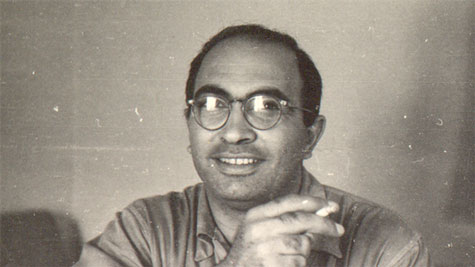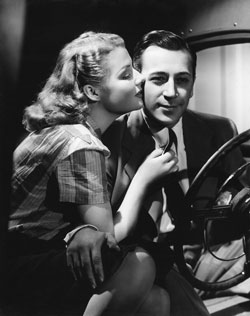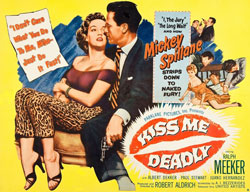
“I like to write about reality.”
A.I. Bezzerides (1908-2007) says that, among other things, in the 2005 documentary that was made about his life and work: The Long Haul of A.I. Bezzerides. In the case of the first of Bezzerides’s three published novels, Long Haul (1938), the reality he wrote about was the life of truckers. This work of proletariat noir has just recently been reissued by 280 Steps, with an introduction by Criminal Element contributor Jake Hinkson.
In penning this first full-length work of fiction, Bezzerides wrote about that which he knew. Born to a Greek-Armenian family who moved from Turkey to California when he was a toddler, Bezzerides worked as a hauler of goods in his early adult years. Drawing on that experience, and with the aid of his talented writing hand, he clearly shows readers the grueling challenges faced by truckers in his day: how little sleep many of them got, and how dangerous it was to drive while exhausted; how they had to battle it out with sleazy freight agents who hired them to haul beer, produce, and others goods from one site to the next, then tried to shortchange them when it came time to pay them for the work; and how these underpayments were most untimely, when there was always the next installment due on their truck payments, vehicle repairs to contend with, and the usual bills. By making us see the troubles these laborers faced, Bezzerides makes us care about them and the particular truckers on which Long Haul focuses. More on those fellas coming up.
 Something else Bezzerides does effectively in this novel is create atmosphere. By then a seasoned hand at fiction writing, one who’d had short stories published in leading literary magazines of the time, the author knew how to set a tone and make his audience see and feel the environment in which his tales took place. Check out this evocative passage from an early part of Long Haul:
Something else Bezzerides does effectively in this novel is create atmosphere. By then a seasoned hand at fiction writing, one who’d had short stories published in leading literary magazines of the time, the author knew how to set a tone and make his audience see and feel the environment in which his tales took place. Check out this evocative passage from an early part of Long Haul:
Buyers were shouting and arguing in the street and trucks unloaded fruit and produce which other trucks reloaded and hauled away. High above, the murky sky pearled and daylight filtered down through the fog. A cold, wet wind blew in from the bay. It was five o’clock when they had finished unloading, but Steiner had not come in yet to pay for the haul, so they walked up and down the street, waiting for him, trying to keep warm.
A block from Mike’s, on a corner, stood the Produce Café. Here, as in Mike’s, men were crowded at the counter and the tables, eating hot cakes, drinking coffee and talking in the loud, boastful voices that men in the markets life to affect. Nick and Paul went in, drank some coffee and walked out again. Six o’clock now. The air had thinned and a pale, lucent light wisped in the street, entering their eyes and clearing their heads. There were fewer trucks now, and though men were still buying and selling, the shouting had subsided. The floor hands and truckers were now free to gather together on the sidewalks and to joke with one another.
The truckers at the center of this novel are two brothers, Nick and Paul Benay, who work together in driving salable goods back and forth between San Francisco and Los Angeles and parts in between and around those cities. Paul is married, and his wife wants them to start a family, but he can’t imagine how they’d be able to feed another mouth with all the difficulty he and Nick have in making a livable income. Nick, whose professional and personal adventures the story more closely follows, is single but becomes romantically involved with a young woman he and his brother pick up hitchhiking during one of their runs.
Paul and Nick face all the difficulties mentioned above in their work as truckers, but they stick to it and try to find ways to stay afloat—and even get ahead—in the wearying profession.
Early in the story, Nick explains to his new lady friend why he and his brother remain in this line of employment:
My brother used to work in a packing house and he never made much money. Just a living and a lousy one at that. He went through the grade schools and had to quit, but I went through high.
Instead of working in a packing house, I worked in a gas station, and I wasn’t any better off than he was. We decided we wanted to get somewhere on our own; we didn’t want to keep working for a bunch of guys that take all you can give and then kick you out. So far, all we’ve got out of trucking is being on our own. But one of these days we’ll get the breaks. There’s a fortune in it, if you can get three or four big rigs and haul plenty of tons. I’ll admit it looks like we’re goofy, but always something happens to knock us down. A tire blows or a rod burns or a rear end tears out. But things like that can’t happen all the time. One of these days things’ve got to go right, and then we’ll make some dough.
Long Haul’s storyline takes form through a few different shakeups that occur in the lives of the Benay brothers. One, is when, fed up with being cheated by the dishonest businessmen who hire them to haul goods, they decide to go into business for themselves: they will try their hands at buying produce and other items from sellers in one location, and then drive the stuff somewhere else and re-sell it, at a profit.
Another twist in the saga happens when Paul is injured during a drive, and Nick has to do the trucking on his own for a time. And then, there is Nick’s love life with his new girlfriend and a look at how his work as a trucker affects their relationship.
Through these situations, Bezzerides lets us see what becomes of the Benay brothers when they are confronted with tests that challenge their integrity, their commitment to their profession, and their ability to persevere in both their working and personal lives amid all the morale-damaging struggles they encounter in their day-to-day existences. This nicely-written passage is an apt snapshot of Nick’s perilous working lifestyle:
On the road back he felt tired and decided to stop at Castaic, but even with the decision to stop firmly set in his mind, he kept going, carried on by the inertia of nearly thirty hours of driving, and it was late in the afternoon when in a dream, he came to a stop on a hill and slammed back the emergency brake. When he looked back he saw the cities of the Southland misted in the abyss of the mountain and he felt such a weariness of the road that his eyes burned. He could hear the singing winds and a strange silence numbed his ears as he fell to sleep.
 Although an ace novelist, as evidenced by Long Haul, Bezzerides is mostly known for his screenwriting. He authored the scripts for some classic film noirs, including Raoul Walsh’s 1940 adaptation of The Long Haul—which is titled They Drive by Night, and stars Humphrey Bogart and Ida Lupino, among othes. Bezzerides converted his own work of fiction into a film script once again in 1949, via the Jules Dassin-directed Thieves’ Highway. The film, based on another Bezzerides trucker story, Thieves’ Market, was published in the same year as the movie’s release, and has recently been reissued by 280 Steps. In addition, Bezzerides is the screenwriter behind one of the great works of film noir, Kiss Me Deadly (1955), directed by Robert Aldrich.
Although an ace novelist, as evidenced by Long Haul, Bezzerides is mostly known for his screenwriting. He authored the scripts for some classic film noirs, including Raoul Walsh’s 1940 adaptation of The Long Haul—which is titled They Drive by Night, and stars Humphrey Bogart and Ida Lupino, among othes. Bezzerides converted his own work of fiction into a film script once again in 1949, via the Jules Dassin-directed Thieves’ Highway. The film, based on another Bezzerides trucker story, Thieves’ Market, was published in the same year as the movie’s release, and has recently been reissued by 280 Steps. In addition, Bezzerides is the screenwriter behind one of the great works of film noir, Kiss Me Deadly (1955), directed by Robert Aldrich.
As a sidenote, the documentary I mentioned in the opening paragraph is available online and definitely worth watching. In the 55-minute program, the writer has a lot of enlightening things to say about his life and work. People like Barry Gifford, George Pelecanos, Mickey Spillane, and Jules Dassin also offer thoughts on Bezzerides.
 It’s intriguing (also funny) to hear Bezzerides say how little he thought of Spillane’s novel Kiss Me Deadly, and to listen to Spillane similarly dis Bezzerides’s screen adaptation of his book. It’s also interesting to listen to Bezzerides talk about how little he thought of the Hollywood lifestyle; how, when he worked as a screenwriter for films, he viewed himself as a Tinseltown outsider that had no time for the movie business social life or rat race.
It’s intriguing (also funny) to hear Bezzerides say how little he thought of Spillane’s novel Kiss Me Deadly, and to listen to Spillane similarly dis Bezzerides’s screen adaptation of his book. It’s also interesting to listen to Bezzerides talk about how little he thought of the Hollywood lifestyle; how, when he worked as a screenwriter for films, he viewed himself as a Tinseltown outsider that had no time for the movie business social life or rat race.
For music heads who might care about such things, the documentary’s soundtrack is made by the band Fugazi.
Somehow or another, I’ve never seen They Drive by Night. I’m about to remedy that. And, I’ll probably follow that viewing with a re-watch of Kiss Me Deadly, and then maybe seek out more of the films Bezzerides wrote for, as well as more as his fiction work. Long Haul, which put me in mind of both John Steinbeck and John Fante, has left me with a hankering for more of A.I. Bezzerides’s slant on reality.
Brian Greene writes short stories, personal essays, and reviews and articles of/on books, music, and film. His work has appeared in over 20 publications since 2008. His pieces on crime fiction and film have been published by Noir Originals, Crime Time, Crimeculture, Paperback Parade, Mulholland Books, and Stark House Press. He is a regular contributor to The Life Sentence crime fiction web site, and Shindig! music magazine. Brian lives in Durham, North Carolina. He can be found on Twitter @brianjoebrain.
